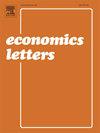非正式性与发展:用阈值证据重新审视非线性动力学
IF 1.8
4区 经济学
Q2 ECONOMICS
引用次数: 0
摘要
本文研究了1990年至2020年150个国家非正式性对经济发展的非线性和基于阈值的影响。利用二元论和制度经济学理论,它采用动态面板阈值模型(DPTM)内生地确定非正式性水平,超过非正式性对发展的影响发生变化。我们的发现揭示了显著的阈值效应。分析表明,在低收入和制度薄弱的环境中,非正式性可以支持发展,但在更发达的经济体中却变得有害。估计了特定区域的阈值:非正式性对增长的促进作用在全球低于20%,在非洲经济体低于37 - 40%,但在高收入国家,即使在低水平也会产生不利影响。制度质量和金融发展也会影响这些动态的性质。这些发现对一刀切的正式政策提出了挑战,表明量身定制的、更具体具体的干预措施可能更有成效。本文章由计算机程序翻译,如有差异,请以英文原文为准。
Informality and development: Revisiting the nonlinear dynamics with threshold evidence
This paper investigates the nonlinear and threshold-based impact of informality on economic development across 150 countries from 1990 to 2020. Drawing on dualistic and institutional economic theories, it employs a Dynamic Panel Threshold Model (DPTM) to endogenously identify levels of informality beyond which the effect of informality on development shifts. Our findings reveal significant threshold effects. The analysis reveals that informality can support development in low-income and institutionally weak contexts but becomes detrimental in more advanced economies. Region-specific thresholds are estimated: informality remains growth-enhancing below ∼20 % globally and ∼37–40 % in African economies but has adverse effects in high-income countries even at low levels. Institutional quality and financial development also influence the nature of these dynamics. These findings challenge one-size-fits-all formalisation policies, suggesting that tailored, more context-specific interventions are likely to be more fruitful.
求助全文
通过发布文献求助,成功后即可免费获取论文全文。
去求助
来源期刊

Economics Letters
ECONOMICS-
CiteScore
3.20
自引率
5.00%
发文量
348
审稿时长
30 days
期刊介绍:
Many economists today are concerned by the proliferation of journals and the concomitant labyrinth of research to be conquered in order to reach the specific information they require. To combat this tendency, Economics Letters has been conceived and designed outside the realm of the traditional economics journal. As a Letters Journal, it consists of concise communications (letters) that provide a means of rapid and efficient dissemination of new results, models and methods in all fields of economic research.
 求助内容:
求助内容: 应助结果提醒方式:
应助结果提醒方式:


